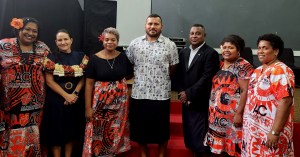
Above: Alzheimer’s Australia supporters and campaigners on the front lawn of Parliament House in Canberra earlier today.
By Yasmin Noone
Placards aren’t ‘usually’ seen in the hands of the less assertive. Protests and marches on parliament house aren’t ‘usually’ their thing either.
But today, more than 500 Alzheimer’s Australia supporters and people living with dementia, their carers and family members – the once mild campaigners – showed the country and in particular, Canberra, that they are not going to sit back any longer.
At 10.30am, they marched from old parliament house in the capital state to new parliament house demanding the federal government take action and provide $500 million over five years to address key priorities and fight the disease.
With placards in hand, boasting the organisation’s new brand and catchcry “Fight Dementia. Save Australia”, the marchers were led by media personality and president of Alzheimer’s Australia, Ita Butrose.
The marchers had three main motivators. CEO of Alzheimer’s Australia, Glenn Rees, explains that firstly, they aim to guarantee funding for their cause.
“The second reason is to make it clear through the Fight Dementia campaign that we really have to tackle dementia in a positive way,” Mr Rees said.
“That links to the idea that it isn’t a natural part of ageing. It is an illness that needs to be tackled like other illnesses.
“We are also marching to show the 1.5 million people that either have dementia or care for someone with dementia that we are actually taking their concerns to a national level.”
Bupa Care Services, Carers Australia, United Voice, the Australian Nursing Federation and Catholic Health Australia, among others, joined the fight for dementia and the march.
Today’s event, Mr Rees explained, signifies a stronger, more assertive organisation and team of supporters who are all ready to “fight” for dementia and ask for what it is that needed.
“If you go back to when I first became CEO of Alzheimer’s Australia, we really weren’t very assertive.
“The big change that has occurred over the last 10 years is that we now have a lot of intellectual capital, evidence [that action is needed] and a greater willingness to speak out.
“…The campaign and the march will have an impact. We’ve already [many] federal politicians as champions on our Fight Dementia site, supporting what we are doing and we have a number more in the pipeline.
“And keep in mind that our state and territory members and consumers have been door knocking senators and members, [asking for their support] for the last six weeks. The march today doesn’t stand alone.
“What we are doing is raising the awareness of the issue. I think people understand what we are seeking.”
New report confirms need for action
Coinciding with the march was the release of the new Access Economics report, commissioned by Alzheimer’s Australia, Dementia Across Australia 2011-2050, which estimates dementia prevalence estimates and projections for Australia. Specifically, this report estimates.
Across Australia, dementia prevalence is expected to grow by around 254 per cent between 2011 and 2050. That is a prevalence increase of 553,285 people by 2030, and 942,624 people by 2050.
The real point of difference of this report however is that it sets out dementia prevalence projections from 2011 to 2050 across each of the 150 electoral divisions of the federal government.
“Across Australia, three South Australian electorates have the largest numbers at present,” the report stated.
“These are Hindmarsh (with 2,940); Sturt (with 2,584); and Boothby (with 2,534 people with dementia).
“By 2050 however, demographic changes mean that the federal electorate division with the largest numbers of people with dementia will be located in Queensland; the top four each projected to be home to more than 10,000 people with dementia.
“By comparison, no state other than Queensland is expected to have an electoral division with more than 10,000 people with dementia over the next 39 years.”
NSW now has 91,308 people with dementia. This number is projected to rise to 303,673 people by 2050. Victoria’s numbers in 2011 are 68,397, projected to increase to 245,831 people by 2050.
The lowest dementia prevalence figure per state or territory is directly related to its population – the ACT now has 3,254 people living with dementia but that is projected to increase to 13,970 people by 2050.
“These projections present a clear warning: The federal government must invest in decisive action to address dementia now, or face far greater costs and much more dramatic consequences in the very near future.”
A copy of the report has been given to every Member of Parliament and Senator to ensure they understand what the dementia epidemic means for their constituency.
Ms Buttrose said the report clearly shows that no state or territory is exempt from the disease now or in the future.
“There are no winners here,” Ms Buttrose said.
“Our ageing population means that every federal electorate in Australia can expect to experience significant growth in the number of people with dementia.
“I have never taken part in a protest march before in my life, but this issue is too important to ignore. Action must be taken and it must be taken now.”
Mr Rees believes that the desired action- which starts with $500 million worth of funding over a period of five years – is not a great deal when it means disease prevention and positive health outcomes.
“What we want will really address the priorities that haven’t been addressed before in a very serious way,” Mr Rees said.
“The other point is that $500 million only represents a three per cent increase in expenditure.
“Things like the under diagnosis of dementia, put a greater emphasis on dementia research, making hospitals safer [for people with dementia]…and dementia risk reduction. None of these issues have yet been picked up in any serious way by the Department of Health and Ageing.”

Dementia must be part of aged care reform
Minister for Mental Health and Ageing, Mark Butler, met the marchers on the front lawn of parliament house and followed Ms Butrose in addressing the crowd but preeceded a person with dementia and a carer who both spoke about their experience with the disease.
The crowd then enjoyed a barbeque lunch and around 200 people moved into the main committee room at Parliament House to listen to more speeches, ask questions about Alzheimer’s disease and offer feedback on the Productivity Commission’s Caring for Older Australians report.
“The year 2020 is just eight short years away but we are not prepared,” Ms Buttrose said.
“Dementia, which includes Alzheimer’s disease, is one of the fastest growing major disease burdens Australia faces. It will be the third largest source of health and residential care spending by 2030.
“In 2005, the Australian government made a commitment to fight dementia, injecting $320 million over five years to the Dementia Initiative. Despite figures indicating the situation would get worse, the Initiative has been discontinued.
“These new figures demonstrate the urgency with which Australia must respond. Dementia must be part of aged care reform.”




My name is Kim Harrington email kim.harrington1@bigpond.com we are a family needing help we have our mum who has alzeimers for the last 6 years she is presently in sensitive care unit in eastern suburbs of melbourne this is our fourth care facility on monday we are due to pay a large bond and are fearful for her safety and care due to not enough staff she has stopped eating we visit daily to check on care and are continually worried for her we need help we dont know who to turn to or what to do next we are seriously considering not paying bond and move her again which puts her in a very vulnerable position and causes her great distress, the government forces us to sell her home and then let her slowly waste away and no one cares..you would do far better to be an azlyum seeker in this country at least you would be heard
My mother is a fourth generation australian she deserves better
Kim
Contact the National Dementia Helpline on 1800 100 500 and talk to one of our counsellors about the problems you are experiencing with your mother.
Ita Buttrose
Thank you Yasmin for covering our story so well. The day is a turning point in the life of our organisation and the determination of people with dementia to tell their story and get change for the better.
We have 20 politicians signed up currently with more to come not 230 as the article reports – it will be a wonderful day when every Federal Member and Senator does sign up!
Glenn Rees
CEO Alzheimer’s Australia